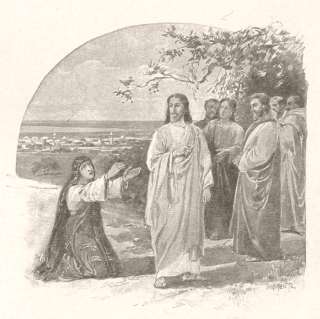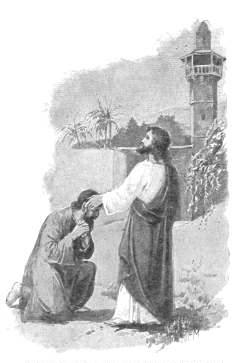Traditions of the elders 1
Defilement by what goes out 14
Greek woman claims crumbs 24
Healing that was not kept secret 31
|
|
|
|
|
|
||
| .1
¶ Then came together unto him the Pharisees, and certain of the scribes,
which came from Jerusalem.
2 And when they saw some of his disciples eat bread with defiled, that is to say, with unwashen, hands, they found fault. .3 For the Pharisees, and all the Jews, except they wash their hands oft, eat not, holding the tradition of the elders. .4 And when they come from the market, except they wash, they eat not. And many other things there be, which they have received to hold, as the washing of cups, and pots, brasen vessels, and of tables. 5 Then the Pharisees and scribes asked him, Why walk not thy disciples according to the tradition of the elders, but eat bread with unwashen hands? |
2
- Unwashen hands You can see in v5 that the Pharisees weren't
concerned with physical filth.
5 - Tradition of the elders Certainly their concern. If people started going only by the Scriptures or doing as they pleased, the religious leaders would lose their respect and their money. |
|
|
.6 He answered and said unto them, Well hath Esaias prophesied of you hypocrites, as it is written, This people honoureth me with their lips, but their heart is far from me. .7 Howbeit in vain do they worship me, teaching for doctrines the commandments of men. 8 For laying aside the commandment of God, ye hold the tradition of men, as the washing of pots and cups: and many other such like things ye do. 9 And he said unto them, Full well ye reject the commandment of God, that ye may keep your own tradition. |
6&7 - In vain Their rules were above those of God. I believe that before the second coming of Christ, we will be seeing the same thing. We saw it demonstrated in the church of the dark ages. |
|
| 10 For Moses said, Honour
thy father and thy mother; and, Whoso curseth father or mother, let him
die the death:
.11 But ye say, If a man shall say to his father or mother, It is Corban, that is to say, a gift, by whatsoever thou mightest be profited by me; he shall be free. 12 And ye suffer him no more to do ought for his father or his mother; 13 Making the word of God of none effect through your tradition, which ye have delivered: and many such like things do ye. |
11 - Corban Jesus' example of hypocrisy was an obvious one. Of course they had a financial incentive to get more money into the temple. On this offering see nu2802. "Christ had already rebuked in denouncing the practice of 'Corban,' by which a neglect of filial duty was concealed under a pretense of liberality to the temple. The scribes and Pharisees were insinuating deceptive principles. They concealed the real tendency of their doctrines, and improved every occasion to instill them artfully into the minds of their hearers. These false principles, when once accepted, worked like leaven in the meal, permeating and transforming the character. It was this deceptive teaching that made it so hard for the people to receive the words of Christ. The same influences are working today through those who try to explain the law of God in such a way as to make it conform to their practices. (Desire of Ages, p. 408). | |
| .14
And when he had called all the people unto him, he said unto them, Hearken
unto me every one of you, and understand:
15 There is nothing from without a man, that entering into him can defile him: but the things which come out of him, those are they that defile the man. 16 If any man have ears to hear, let him hear. 17 And when he was entered into the house from the people, his disciples asked him concerning the parable. 18 And he saith unto them, Are ye so without understanding also? Do ye not perceive, that whatsoever thing from without entereth into the man, it cannot defile him; |
15 - Nothing from without ... defile The issue is that ideas from within (oral tradition v3) are not what defiles. Humans are not a safe source for knowing truth. God, who is outside of man, should be trusted. Jesus was not referring to clean and unclean foods. | |
| .19
Because it entereth not into his heart, but into the belly, and goeth out
into the draught, purging all meats?
20 And he said, That which cometh out of the man, that defileth the man. 21 For from within, out of the heart of men, proceed evil thoughts, adulteries, fornications, murders, 22 Thefts, covetousness, wickedness, deceit, lasciviousness, an evil eye, blasphemy, pride, foolishness: 23 All these evil things come from within, and defile the man. |
19
- Entereth not into his heart The unwashed cup would have
no effect on character.
19 - Purging all meats This verse is often misunderstood and mistranslated. For example, beginning in the middle of v18, we see that it is not what we eat the defiles us because it does not go into the heart, but into his stomach, and is eliminated. (Thus He declared all foods clean.) NASB shown here in green. Italics from this version. The NIV reads essentially the same way. It may appear that Jesus was saying that animals which God declared to be unclean even before the flood (Gen. 7:2) were now clean and could be eaten. From the Greek is is clear that the words "purging all meats" were commentary added by Mark and are not the words of Christ. What Mark had in mind is not important to the discussion. 19 - Meats The word is bromata which means "that which is eaten." 20-23 - That which cometh out ... defileth Evil thoughts and words show that one is unfit for the pure atmosphere of heaven. The context (verses 1-14, 20-23) shows that the uncleanness is as defined by the Jewish ceremonial laws which Christ identified as "commandments of men" (v3). |
|
|
|
||
| .24
¶ And from thence he arose, and went into the borders of Tyre and
Sidon, and entered into an house, and would have no man know it: but he
could not be hid.
25 For a certain woman, whose young daughter had an unclean spirit, heard of him, and came and fell at his feet: 26 The woman was a Greek, a Syrophenician by nation; and she besought him that he would cast forth the devil out of her daughter. 27 But Jesus said unto her, Let the children first be filled: for it is not meet to take the children's bread, and to cast it unto the dogs. 28 And she answered and said unto him, Yes, Lord: yet the dogs under the table eat of the children's crumbs. 29 And he said unto her, For this saying go thy way; the devil is gone out of thy daughter. 30 And when she was come to her house, she found the devil gone out, and her daughter laid upon the bed. Some have seen Jesus' statement in v27 to be a sign of racism. Also consider his anti-racism story beginning at lu1025. And see lu1716. |
 27 - This is what a Jew would say. Jesus was testing her, too. Explained more at mt1521ff. |
|
 .31
¶ And again, departing from the coasts of Tyre and Sidon, he came
unto the sea of Galilee, through the midst of the coasts of Decapolis. .31
¶ And again, departing from the coasts of Tyre and Sidon, he came
unto the sea of Galilee, through the midst of the coasts of Decapolis.
32 And they bring unto him one that was deaf, and had an impediment in his speech; and they beseech him to put his hand upon him. 33 And he took him aside from the multitude, and put his fingers into his ears, and he spit, and touched his tongue; .34 And looking up to heaven, he sighed, and saith unto him, Ephphatha, that is, Be opened. 35 And straightway his ears were opened, and the string of his tongue was loosed, and he spake plain. 36 And he charged them that they should tell no man: but the more he charged them, so much the more a great deal they published it; 37 And were beyond measure astonished, saying, He hath done all things well: he maketh both the deaf to hear, and the dumb to speak. 34 - Ephphatha Transliteration from the Aramaic, the common language/dialect. See on Syriac. 34 - Heaven Jesus longed for ears to be opened to the message of salvation. Also see mt1529ff. |
||
| Previous | Next | Mark home | Commentary home | Contact |